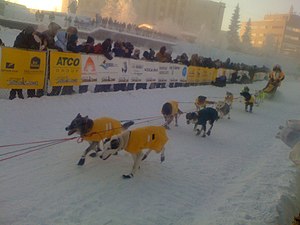Our website is made possible by displaying online advertisements to our visitors.
Please consider supporting us by disabling your ad blocker.
Yukon Quest
This article needs to be updated. (June 2023) |

The Yukon Quest, formally the Yukon Quest 1,000-mile International Sled Dog Race, is a sled dog race scheduled every February since 1984 between Fairbanks, Alaska, and Whitehorse, Yukon, switching directions each year. Because of the harsh winter conditions, difficult trail, and the limited support that competitors are allowed, it is considered the "most difficult sled dog race in the world",[1] or even the "toughest race in the world"[2]—"even tougher, more selective and less attention-seeking than the Iditarod Trail Sled Dog Race."[3] The originator envisioned it as "a race so rugged that only purists would participate."[3]
In the competition, first run in 1984, a dog team leader (called a musher) and a team of 6 to 14 dogs race for 10 to 20 days. The course follows the route of the historic 1890s Klondike Gold Rush, mail delivery, and transportation routes between Fairbanks, Dawson City, and Whitehorse. Mushers pack up to 250 pounds (113 kg) of equipment and provisions for themselves and their dogs to survive between checkpoints. Each musher must rely on a single sled for the entire run, versus three in the Iditarod.[3]
Ten checkpoints and four dog drops, some more than 200 miles (322 km) apart, lie along the trail. Veterinarians are present at each to ensure the health and welfare of the dogs, give advice, and provide veterinary care for dropped dogs; together with the race marshal or a race judge, they may remove a dog or team from the race for medical or other reasons. There are only nine checkpoints for rest, versus 22 in the Iditarod.[3] Mushers are permitted to leave dogs at checkpoints and dog drops, but not to replace them. Sleds may not be replaced (without penalty) and mushers cannot accept help from non-racers except at Dawson City, the halfway mark.
The route runs on frozen rivers, over four mountain ranges, and through isolated northern villages. Racers cover 1,016 miles (1,635 km) or more. Temperatures commonly drop as low as −60 °F (−51 °C), and winds can reach 50 miles per hour (80 km/h) at higher elevations. Because it begins a month earlier than the Iditarod, the Quest is a colder race, and is run on shorter solar days and through longer, darker nights.[3] Sonny Lindner won the inaugural race in 1984 from a field of 26 teams. The fastest run took place in 2010, when Hans Gatt finished after 9 days and 26 minutes. The 2012 competition had the closest one-two finish, as Hugh Neff beat Allen Moore by twenty-six seconds.
In 2005, Lance Mackey became the first Yukon Quest rookie to win the race, a feat that was repeated by 2011's champion, Dallas Seavey. In 2007, Mackey became the first to win both the Yukon Quest and the Iditarod, a feat he repeated the following year. The longest race time was in 1988, when Ty Halvorson took 20 days, 8 hours, and 29 minutes to finish. In 2000, Aliy Zirkle became the first woman to win the race, in 10 days, 22 hours, and 57 minutes. Yukon Quest International, which runs the Yukon Quest sled dog race, also runs two shorter races: the Junior Quest and the Yukon Quest 300 (previously the Yukon Quest 250).
The 2020 race finished on schedule despite the incipient COVID-19 pandemic, however the 2021 race was cancelled due to border closures and Covid protocols. In 2022, the US and Canadian sides separated to produce their own shorter versions of the races. To maintain a competitive format, the organizations adopted a multi-race format of different distances that ran along the portions of the trail on either side of the border. This format continued in 2023 and will be the same for the 2024 races. The Yukon Quest International Association (Canada) manages the Canadian side of the Yukon Quest.
- ^ Cite error: The named reference
zirklewas invoked but never defined (see the help page). - ^ Cite error: The named reference
balzar 15was invoked but never defined (see the help page). - ^ a b c d e Joyal, Brad. "There's a sled dog race tougher than the Iditarod, and a 78-year-old crazy enough to try it". The Washington Post. No. February 24, 2019. Retrieved 3 March 2019.
Previous Page Next Page


